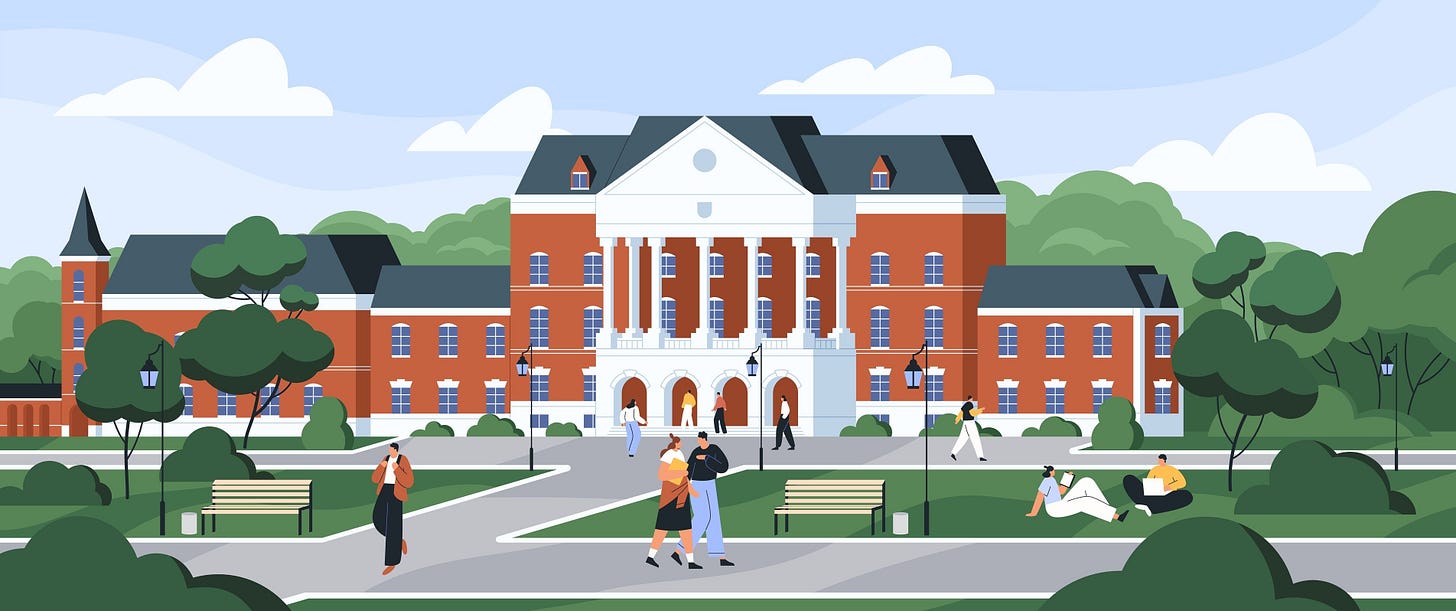E-Pluribus | March 1, 2023
Misinformation isn't one-sided; lowering the common denominator in the name of equity; and examining the campus free speech lexicon.
A round-up of the latest and best writing and musings on the rise of illiberalism in the public discourse:
Matthew Yglesias: Misinformation Isn't Just on The Right
Matt Yglesias is driving some on the Left crazy just as David French is doing to some on the Right. In his latest at his Slow Boring site, Yglesias takes on the notion that misinformation is the domain of The Right, and one of his prime examples is (ouch!) climate change.
[T]his whole genre of genuine inquiry into public opinion dynamics has gotten derailed, I think, by the sort of goofy idea that Donald Trump was swept into power by a tidal wave of “misinformation” or the conceit that it’s constructive to analyze GOP outreach to Hispanic voters primarily through the “misinformation” lens.
The thing that makes this sort of superficial analysis so seductive is that it’s not exactly wrong. Most people really are very poorly informed about politics and policy. A lot of campaign messaging is pretty misleading. A lot of media coverage is sloppy and propagandistic. It’s also true that as a result of education polarization, over the past few cycles, Democrats have mostly done worse with relatively uninformed demographic groups (poor white people, working-class Hispanics) and better with relatively well-informed high-SES whites. This is to say that if you set out to find misinformation among people voting Republican, it’s not hard to do so. But it’s a totally unprincipled inquiry unless you take a systematic look at misinformation, in which case you’ll see it’s hardly confined to Republicans.
I think the most salient example of this is climate change, where you not only have rightists spreading insane conspiracy theories (Trump used to say it was a Chinese hoax), but you also have a lot of very influential wrongheaded ideas on the left.
[ . . . ]
I think it’s very clear that Trump’s followers were and are possessed by a lot of conspiracy theories and misinformation. I also think, as I argued above, that the leftist faction that has become increasingly influential in the Democratic Party has fallen for a decent amount of misinformation. But if you want to understand the role of misinformation in destabilizing the sensible center of American politics, I think you primarily have to point the finger inwards at the one-two punch of Iraq and the Great Recession in which establishment elites, gassed up on their own misinformation, badly mismanaged the country.
Read the whole thing.
Emma Camp: To Increase 'Equity,' This California High School Is Eliminating Honors Courses
“When everyone is super, then no one will be,” Syndrome famously declared in The Incredibles. In the wake of the news that some high schools never informed some students of their National Merit awards, a Los Angeles public school has decided to end honors courses due to concerns about the racial makeup of the classes, reports Emma Camp for Reason. The school apparently decided that if no one is special, then…
Starting this school year, Culver City High School, a public school in a middle-class suburb of Los Angeles, eliminated its honors English classes for ninth- and 10th-graders. Instead, students are only able to enroll in one course called "College Prep" English. The decision, according to school administrators, came after teachers noticed that only a small number of black and Hispanic students were enrolling in Advanced Placement (A.P.) courses.
"It was very jarring when teachers looked at their AP enrollment and realized Black and brown kids were not there. They felt obligated to do something," said Quoc Tran, the district's superintendent. . .
"School officials say the goal is to teach everyone with an equal level of rigor, one that encourages them to enroll in advanced classes in their final years of high school," Randazzo notes.
However, parents—and students—disagree. "There are some people who slow down the pace because they don't really do anything and aren't looking to try harder," Emma Frigola, a ninth-grader at the school, said. "I don't think you can force that into people." She added that the curriculum has been made easier to accommodate less advanced students.
[ . . . ]
Despite school officials' concerns about equity, it's worth noting that despite teachers' concerns, black students were almost exactly proportionally represented in A.P. courses—just one percentage point off. It's also possible that part of the reason why Latino students are underrepresented in A.P. courses is that the data don't differentiate between students who are and aren't fluent in English.
Read it all here.
Bradford Vivian: The Language of Campus Misinformation
Bradford Vivian of Arc Digital acknowledges that free speech on college campuses is at risk. However, Vivian argues that some who claim to be fighting for free speech are actually part of the danger themselves and that the very language they use reinforces political stereotypes instead of producing a true open atmosphere for free expression.
Unconventional key terms or tropes reappear across the previously quoted statements from remarkably different social or political figures: trigger warnings, safe spaces, speech zones or speech codes, oversensitivity among college students or a desired to be shielded and protected from ideas that make them uncomfortable. These nearly identical key terms or tropes, sustained over a period of years in many different public forums, reflect a relatively common underlying worldview.
That worldview coalesces in the following core assumptions: College campuses dangerously cater to undergraduate students. Those students irrationally crave confirmation of their existing naïve and radical ideas. Higher education now mostly consists of ongoing efforts to prevent such students from overtaking and shutting down entire campuses. College campuses are therefore proving grounds for allegedly radical takeovers of civic institutions.
This kind of language turns fixations with miscellaneous conflicts on specific campuses into sweeping condemnations of higher education in general. That language also turns speculative theories or stereotypes about large groups of students and faculty into allegedly accurate depictions of their supposedly dangerous psychology or motivations.
I encourage a different framework of debate that better informs the public about issues of academic freedom from multiple constructive viewpoints. Understanding how stereotypically liberal or conservative viewpoints operate within social groups is important. Using those political stereotypes as a dominant lens to assess the complexities of higher education can be reductive and misleading. Engaging in public dialogue about important civic institutions without relying on stereotypes about conservative and liberal identity as a primary, all-purpose analytic lens can empower even people who do not belong to universities to better understand the most serious threats to free speech and academic freedom on college campuses—and, by extension, threats to civil liberties writ large.
Read it all.
Around Twitter
The Foundation for Individual Rights & Expression on Stanford’s anonymous reporting system versus free speech:
Former Fox News contributors Jonah Goldberg and Steve Hayes react to revelations in the Dominion Voting Systems vs. Fox News lawsuit:
And finally, perhaps George Orwell should have titled his book 2023:









